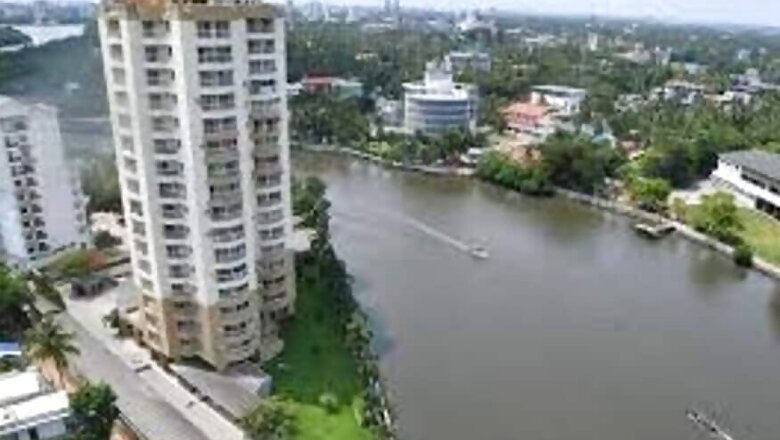
views
Kochi/Bengaluru: The Supreme Court on Tuesday refused to allow a Rs 1,800-crore realty project with over 90,000 flats abutting a wetland in Chandigarh. Perhaps the intervention came early enough. Residents of five apartments in Kochi that were built nearly ten years back weren’t so lucky, as they wait for the inevitable – they have been told by the government that their apartments will be razed, just as the SC ordered nearly two months back.
Hapless residents, though, feel they are being punished for someone else’s fault – when they bought the apartments, the papers were clear, the construction was legal. But they have been forced to vacate these homes – all bought at upwards of half a crore rupees – and are ruing that their appeals haven’t been heard.
“When one fine morning you are kicked out of your house… how do you feel? I think even somebody on the street must not have felt it – you are just kicked out… one fine morning you come and say ‘within three days or one week, you just vacate’. Where do I even put my furniture? I need to take a place on rent, I need to dismantle all these things. Can you imagine? Ninety apartments; everything is getting demolished. People are taking it away and loading it into trucks ... It was absolute mayhem out there,” says Sreeshankar Radhakrishnan, a financial analyst and one of the residents.
“They asked us to vacate the premises in six to seven days. That was humanly impossible; even they knew it. But they somehow made us run from our homes, like evicting cockroaches,” says Ramesh Menon, an entrepreneur and IT consultant, adding that the homeowners don’t know whom to trust any longer. “I’ve asked all my friends (abroad) to never come back to invest anything here, because there are no guarantees here.”
Ramesh Menon’s brother Suresh Menon had invested in a flat at H20 Holy Faith apartments more than 10 years ago. He fell ill, and passed away in 2010, after which his family moved into the flat they had always seen as a source of security and independence.
They were jolted out of their tranquility by a snapping of power supply in September, after which they moved out with no choice. Suresh’s wife and two sons live in their uncle’s home now. Suresh’s son Saurav says it was not about just losing something materialistic. It is about losing a home, a substantial part of their lives.
“We have not done anything wrong to deserve this. What have we done wrong?” he asks, adding that he has lost trust in all that he studied through his student life about civil rights and the system protecting the people.
The saga that began nearly ten years back, spanning court cases at different levels, looks set to end by this month, with the government now calling for bids to bring down the apartments which violate coastal zone regulations.
But the episode has raised many questions about how the system has shirked every homeowner's rights, besides not effectively holding accountable all the officials or builders who were complicit in carrying out these violations. To bring down these apartments may ‘set an example’ for many other builders, but it may also open up a Pandora’s Box for at least 600 other violators who have built concrete structures along the edge of the Vembanad backwaters.
The Vembanad Lake is among Asia’s biggest, spread around three districts. Since 2002, it is included in the list of wetlands of international importance, and is known for eco-sensitive mangroves. The coastal zone management authority had sued the builders for their constructions violating the law.
The issue of violations along this lake has come up more starkly, ever since floods hit Kerala for two consecutive years – many environmentalists look at the deluge as the direct impact of climate change, and violations of land-use regulations are blamed for it to some extent. So if bringing down five multi-storeyed structures is being seen as drastic, it was probably warranted in drastic times, they say.
“It’s actually the violations that have been drastic, it has already exceeded any levels of sanity,” says environmentalist Sridhar Radhakrishnan. “And you allow it more to happen, then you are going to get into deep trouble because all these places are also critical vulnerable regions with very fragile ecology. And hence, it had to be drastic and in this case it is very interesting, because it is not the state which wants the drastic step, but the court which is saying to do it. And obviously behind the court’s mind there is this question that at some point the law had to stand up,” he adds.
Radhakrishnan believes the homeowners were clearly conned by the builders. But where does the buck stop? How did municipal officials allow such large structures to come up without blinking? Why didn’t the regulatory bodies stop it before the construction was completed? These flats were bought by people who are educated, informed professionals. Many are NRIs who were buying their post-retirement abode. They were sanctioned bank loans, after due process. How did they suddenly become violators of the law?
Beena Mariyadas, a homeowner who has now moved to a different locality of Kochi, says the residents tried to hold protests in the wake of the court orders too, but none of it helped retain their homes. “They shouldn’t allow construction, they shouldn't give sanction if it is at a wrong location or a coastal area. These many people will not have to struggle then. How we are all struggling now,” she says.
Chennai-based environmentalist Nithyanand Jayaraman points out that accountability must go all the way up, to the highest officers who allowed the construction.
"I don't think the system is protecting anybody. My concern is environment and public safety… a building has been constructed, endangering the residents of that building, endangering the surrounding areas. How did the regulators allow this? There is no accountability among regulatory agencies like the pollution control board or the revenue officials. The real estate lobby runs this country, as much as other corporate lobbies,” he says, adding corrective measures would only be taken if all the approvers of the project are held to account.
The demolition itself may not be a great idea. Sridhar Radhakrishan points out that it could lead to as much environmental damage. “Demolition will have a huge impact. Around 40,000 metric tonnes of dust and debris needs to be removed. It will take at least three-four months of transport… You know Kerala has heavy rains every alternate day. A study by the Indian Institute of Technology Chennai says that if there is one or two rains, half this debris will automatically go into the lake. Even if 25 per cent does, then 60 per cent of the biodiversity is affected. If you are concerned about the environment, you are doing the most environmentally destructive thing,” he says.
Besides, the ‘example’ of the five apartments in Maradu may just be part of a wider correction. The floods of the last two years may have pushed the government into action, but there are at least 625 other structures along the backwaters that are built in violation, according the government's own estimates.
"The court hasn't spoken only about this project. The court has asked about other illegal buildings too, and asked us to submit the numbers. The government is on that. We haven't thought about other steps, but the count of illegal buildings is on," says AC Moideen, the minister for local self governments.
The state government is in a fix as it couldn't defend its action and has to now compulsorily furnish data on other violators to the court, says Sridhar Radhakrishnan.
"It has to now go to court and give a list of all buildings that have violated the law. The court can actually sit on more than 600 buildings that I understand is on the list. We don't know what the court will say about it. Technically speaking and legally speaking, they would have to face the same consequence, because it is a precedence question and it is also the rule of law... so I feel all these buildings are in trouble," he says.
But for the inhabitants, this is a debate for others. As far as the homeowners are concerned, they are still wondering why they are paying the price for a mess created by builders and municipal officials, who seemed to have ignored coastal zone norms for, what is apparently, just plain bribery.
"That is a call for environmentalists to take. I'm here as a person who wanted a dwelling, when the permit is given by the panchayat, I expect that it has cleared all requirements of all environmental parameters. I believe we have been let down by the system. I didn't commit any harm, nor did I commit any illegality, but we are the party losing our hard-earned money in the bargain,” says Sreeshankar Radhakrishnan.
While the court has ordered for payment of interim compensation, many residents believe it is unjust, and the government hasn't been able to safeguard their rights. “Our human rights are violated, we were never heard in the case. The government failed to enforce and implement the law at the right time,” says Antony C Ettukettil, a local resident.
“I have been paying tax, am a law-abiding citizen. I believed the law: that the law will protect innocent citizens. But here we see the government taking away our taxes and our homes,” says Dr Anand Kumar, another resident. A wrong message is being given that you can work hard, and build a house, but someday the government will evict you for the misdeeds of somebody else.”


















Comments
0 comment